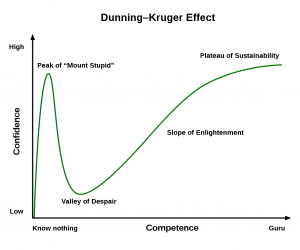The Dunning-Kruger study has almost achieved ‘meme’ status as evidenced by the prevalence of a graph labelled “Dunning-Kruger Effect” which circulates and is popularized, yet certainly does not appear in their original 1999 paper:

The irony of the use of the graphic is that so many people who use this graph have no actual understanding of the underlying study itself, and therefor the conclusions and implications that DK were exploring. As often as not, in my experience, people who refer to DK or post the graph are themselves demonstrating the Dunning-Kruger Effect about the Dunning-Kruger study.
There are valid and interesting criticisms of the paper, but that was not the focus of my presentation.
The key as it relates to my topic, The Epistemological Crisis, is that people who lack expertise (‘incompetent’ in DK vocabulary) in a domain (subject/topic) lack the ability to evaluate their competence (or specifically – their incompetence) in that domain – a metacognitive ability specific to that domain.
The implication, for me and the E-Crisis, isn’t just people who are ‘wrong’ but people who may be ‘correct’ – but both ‘incompetent’ sets share the same level of metacognitive ability to evaluate and critique their own knowledge and that of other people’s knowledge of the subject, and the process by which they arrived at their (or others’) conclusions.
Is being ‘correct’ but not knowing how or why you are ‘correct’ any better than being incorrect in a domain / subject?
… Kenny
Dunning-Kruger Paper:
https://www.gwern.net/docs/psychology/1999-kruger.pdf
Citation:
Kruger, J., & Dunning, D. (1999). Unskilled and unaware of it: how difficulties in recognizing one’s own incompetence lead to inflated self-assessments. Journal of personality and social psychology, 77(6), 1121.
